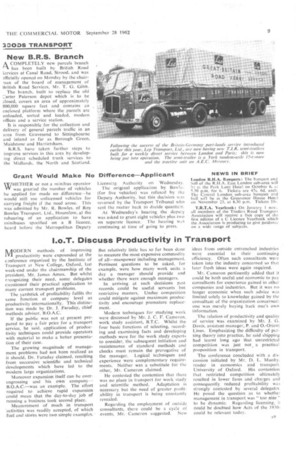I.o.T. Discuss Productivity in Transport
Page 11

If you've noticed an error in this article please click here to report it so we can fix it.
MODERN methods of improving productivity were expounded at the canference organized by the Institute of Transport at New College, Oxford, last week-end under the chairmanship of the president, Mr, James Amos. But whilst recognizing their need, some delegates questioned their practical application to many current transport problems.
The yardstick of profitability fulfils the same function at company level as productivity internationally. This distinction was made by Dr. J. Faraday, chief methods adviser, 11.0.A.C, If the public was not at present prepared to pay a fair price for a transport service, he said, application of productivity techniques could provide operators with material to make a better presentation of their case.
The growing magnitude of management problems had not been realized as ii should, Dr. Faraday claimed, resulting from successive scientific and technical developments which have led to the modern large organizations.
Moreover expansion itself can be overengrossing and his own company-B.O.A.C=was an example. The effort required to achieve rapid expansion could mean that the day-to-day job of running a business took second place.
Measurement of much in transport activities was readily accepted, of which fuel and stors Were two simple examples. But relatively little has so far been done to measure the most expensive commodity of all—manpower including management. Pertinent questions to be asked, for example, were how many work units a day a manager should provide and whether there were enough managers.
In arriving at such decisions past records could be useful servants but restrictive masters. Undue competition could mitigate against maximum productivity and encourage premature replacement.
Modern techniques for studying work were discussed by Mr. J. C. F. Cameron. work study assistant, B.T.C. Whilst the four basic functions of selecting, recording and examining facts and developing methods were for the work study experts to consider, the subsequent initiation and maintenance of standard methods and checks must remain the prerogative of the manager. Logical techniques and experience were complementary requirements. Neither was a substitute for the other, Mr. Cameron claimed.
He contested the contention that there was no place in transport for work study and scientific method. Adaptation is necessary, but the need of greater profitability in transport is being constantly revealed.
Regarding the employment of outside consultants, there could be a cycle of events, Mr. • Cameron suggested, New ideas from outside entrenched industries were essential to their continuing efficiency. Often such consultants were taken into the industry concerned so that later fresh ideas were again required.
Mr. Cameron pertinently added that it could be both useful and economic to pay consultants for experience gained in other companies and industries. But it was no longer economic when such advice was limited solely to knowledge gained by the consultant of the organization concerned: one was merely buying back one's own information.
The relation of productivity and quality of service was examined by Mr. J. G. Davis, assistant manager, P. and 0.-Orient Lines. Emphasizing the difficulty of putting theory into practice, he said shipping had learnt long ago that unrestricted competition was just not. a practical proposition in transport.
The conference concluded with a discussion initiated by Mr. D. L. Munby. reader in economics and transport. University of Oxford. His contention that restricted competition ultimately resulted in lower fares and charges and consequently reduced profitability was strongly contested by several delegates. He posed the question as to whether management in transport, was too nice to be dynamic. Regarding licensing. ii could be doubted how Acts of the 1930 could be relevant today.






































































































































































